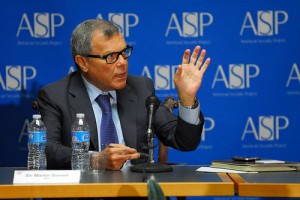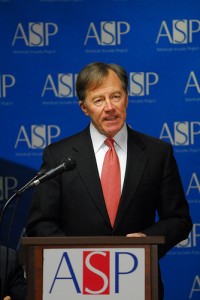
Event Recap: Nation Branding and Global Politics
Podcast: Play in new window | Download
Subscribe: Apple Podcasts | RSS

Sir Martin Sorrell, founder and CEO of the world’s largest communication agency, discussed nation branding.
“The best branding is good policy,” said Sir Martin Sorrell, founder and CEO of the world’s largest advertising and communications company, WPP. Sir Martin was the main speaker at ASP’s event on Nation Branding and Global Politics earlier today, where he shared perspectives on country and city branding. Stephen Cheney, ASP’s CEO, joined the panel alongside Nelson Cunningham, ASP board member and president of McLarty Associates.
Listen to the event here
Some of Mr. Sorrell’s companies are behind several nation branding campaigns, including Mexico, India, Qatar, and the United States among others. And while most people understand the importance of branding to further a country’s national goals, he said, few know how to implement them successfully.
Although America’s image abroad has suffered in the past decade, he stressed the power it still commands and will continue to, despite the emergence of countries like China. “It’s always dangerous to underestimate America…It is in a much more powerful position than some want to recognize,” he added. However, as it faces budget constraints and a slow economic recovery, the United States must be more strategic with its investments, he said.
Particularly on resources for defense and foreign aid, the U.S. government must prioritize to be more effective. Message coordination is also key for the success of these efforts, he added. That is what makes China and Singapore so effective in managing their global brands. Their governments, he observed, synchronize messages across different ministries and departments.
Even amidst tightening budgets at home and abroad, WPP’s fastest growing client segment is still governmental, which highlights the worldwide perception of the importance of communication strategies.
Questioned on the best way to reach out to countries and groups that see the U.S. as an enemy, or that have “extreme opinions,” he maintained that neither propaganda nor force can win alone. Alongside those efforts must be economic programs to help countries, especially in the Middle East. “The Arab Spring was about unemployment” and the poor economic state of those countries, he said.
But according to Sir Martin, the audience can’t be lied to, and he believes good branding builds on the truth of a good product. “You can only sell a bad product once,” he said, and so nations must be sure they are selling their positive aspects and good policies to begin with.
For him, the future of nation branding lies, partly, with cities and states in the way of sub-state diplomacy. Sir Martin sees an increase on city branding which is poised to continue, since 50% of the world’s population lives in cities, with that number expected to rise substantially in the upcoming years. Because of their size, cities and states can at times be more successful as it is easier for them to coordinate messages.
Even as national governments grapple with how to present their international images, he pointed to the fact that what is done at the government level can be negated by what happens in the private sector. Companies and their products can shift foreign audiences’ perspectives of a country. In a globalized age, nations must understand they may not be able to control their messages entirely but should strive to shape global narratives regardless.
Click below to listen to the event:
Video:
flickr gallery:
Sir Martin Sorrell: Nation Branding and Global Politics, a set on Flickr.

























[…] you can watch and listen to this event and read our report here […]
[…] Listen to an audio recording of the event at the ASP Web site. […]
[…] Martin Sorrell, chief executive of advertising and media giant WPP, said this week at an American Security Project event that the fastest growing segment in the company’s array of businesses around the world is […]
[…] Event Recap: Nation Branding and Global Politics […]
[…] growing client segment is still governmental,” Sorrell declared in a lecture on “nation branding,” where he praised China and Singapore as “so effective in managing their global […]